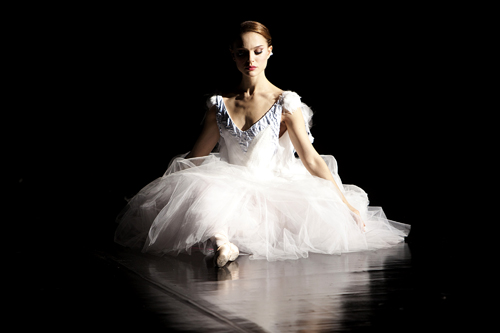
According to Black Swan director Darren Aronofsky (Requiem for a Dream, The Fountain), the film is a companion piece of sorts to his 2008 film, The Wrestler. The comparison is a useful one: Both films feature a protagonist pursuing their respective craft—ballet for the former, pro wrestling for the latter—to crippling, cringe-inducing and terrifying lengths.
The Wrestler tackled this theme with superb understated performances from Mickey Rourke and Marisa Tomei. The pathos felt organic and well-earned, springing from the actors’ chemistry and dark, honest portrayals.
Black Swan (2010) goes a different route, employing horror movie techniques—preposterous close-ups, jittery jump-cuts and a musical score that throws Natalie Portman’s labored breathing high above minor-key orchestration—to overwhelm the viewer with its notions of the duality of humanity, of light and dark, good and evil.
The film, which secured several Academy Award nominations and earned Portman an Oscar for Best Actress, is showing this weekend at Portland State’s 5th Avenue Cinema.
Black Swan follows Nina Sayers (Portman), an accomplished and seriously devoted ballerina in a prestigious New York ballet company. (When I say the film “follows,” I mean that literally: The viewer gets well-acquainted with the back of Portman’s ponytail as the camera follows her around pretty much everywhere.)
Nina is prim and prudish. She still lives with her mother (Barbara Hershey, in a stage-mom role that makes Toddlers & Tiaras look downright pleasant), and her idea of unwinding after a day spent dancing is to go home and dance, and not in a “Let’s thrown on the new Girl Talk album” kind of way. Nina Sayers is like a CPA who goes home and does more taxes.
The ballet company is debuting director Thomas Leroy’s (Vincent Cassel) take on Tchaikovsky’s Swan Lake, and Thomas must find a ballerina who can play both the graceful, virginal White Swan and the dark, sensual Black Swan. Nina can play virginal like whoa but, of course, struggles to let go of her inhibition long enough to play the far more sinister role.
“Perfection is not just about control,” Thomas tells Nina early on in the film, “It’s about letting go.” Aronofsky plays up the black/white dichotomy to the hilt, never missing an opportunity to depict Nina and her surroundings as chastely as possible and playing up the darkness emanating from fellow ballerina Lily (Mila Kunis), a more erotic, though less technically proficient, dancer whom Thomas brings in from San Francisco.
Portman and Kunis’ portrayals of the rival dancers are admirable, but the story is so wrapped in allegory and allusion that the women’s respective roles feel two-dimensional.
Kunis’ Lily, in particular, is such a caricature—more by dint of the film’s obsession with duality and “doubles” than through any fault of Kunis’—that her personality quirks feel like a checklist of “bad girl” clichés. She has streaks in her hair, which she wears down (even when she’s dancing!); her back is covered in an intense, black winged tattoo; she smokes (even indoors where it is explicitly prohibited!); she not only orders a hamburger at the bar but orders it extra bloody, etc., etc. I suppose Aronofsky wants us to see and understand the dark side of the demure Sayers, but two underwritten roles do not add up to one fully-realized one.
Black Swan is often billed as a psychological thriller, and it certainly creeps and crawls. Aronofsky utilizes some very stylish and terrifying tricks, mostly involving skin, cuts and mirrors. By the second act, I kept imploring Nina to please, for the love of God, just stay out of the bathroom for a few minutes. Scenes like these toy with Nina’s (rapidly declining) grasp of reality, and they work to convey the toll her role in Swan Lake is taking on her. Hersey and Winona Ryder (who steals numerous scenes as erstwhile prima donna Beth Macintyre) both deliver formidable supporting roles.
Cassel’s Thomas is the only male character of any import, and his slimy, hyper-sexualized director has complete control over the women in his company. When Nina learns she will play the role of Princess Odette/Odile in Swan Lake, her first words to her mother are a desperate “He picked me.” Despite her enormous investment and ability, it always comes down to Thomas’ approval. Lily, as Nina’s double, appears to be the only dancer who sees through all of his pomp and pretentiousness, rightly telling Nina, “He’s a prick.” But even after Nina’s inevitable transformation, Thomas never gets his comeuppance.
Aronofsky certainly has style galore. The sets and costumes are impeccably designed, and the visuals all serve his singular vision. But the combined effect leaves the viewer cold. There is little substance behind these highly-stylized set pieces and gorgeous, perfectly-groomed actors.
Ultimately, Aronofsky’s film doesn’t amount to a well-rounded artistic statement but a calculated intellectual experiment that lacks the guts or depth of The Wrestler, Black Swan’s superior companion piece.
Black Swan (2010)
Friday, Feb. 17, and Saturday, Feb. 18, 7 and 9:30 p.m.
Sunday, Feb. 19, 3 p.m.
Free for PSU students and faculty with ID; $2 for all other students and seniors; $3 general admission

